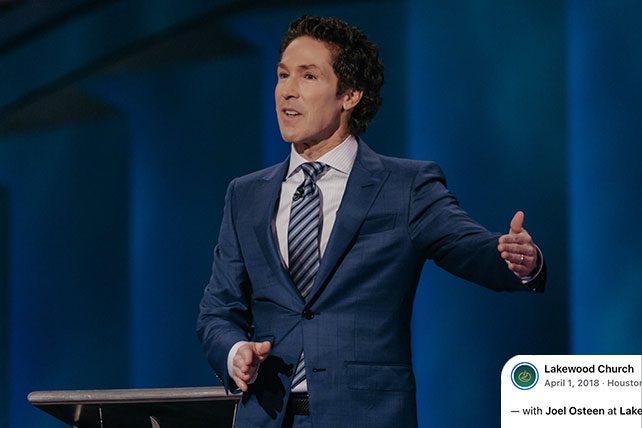The University of Toronto wanted to explore the effect the prosperity gospel has on people’s outlook on life and their consequent actions. Researchers employed popular preacher Joel Osteen’s messages for their social experiment. Their conclusion: The prosperity gospel makes people optimistic, happy and even a little irresponsible with money.
The prosperity gospel “sort of primes people to want to part with their money by making them excited and optimistic,” psychology professor and co-author of the study Geoff MacDonald says.
The researchers felt there was a lack of information on the prosperity gospel, which is “unlike many of the dominant religions that tend to be studied by psychologists,” according to the study’s lead author Nick Hobson. As a press release on the results of the study describes it, prosperity gospel messaging leads people into “thinking God wants you to be wealthy, prosperous and donate money to the church.”
To test the effect this particular teaching has on people, the researchers had a very curious method. They took two three-minute clips from sermons by Osteen, one featuring prosperity-gospel messaging, and the other without. Hobson and his colleagues then randomly assigned one of the two clips to the study participants and asked them to watch it. The participants’ level of optimism for the future was then rated on a scale that ranged from “much less/worse than others” to “much more/better than others.” If a participant responded on any optimism level higher than “equal to others,” researchers concluded the person was “unrealistically optimistic.”
The study, which was published in Psychology of Religion and Spirituality, found that those participants listening to the prosperity gospel message clip were more likely to respond above the “equal to others” benchmark on the optimism scale.
Hobson and his colleagues also noticed a curious thing about non-Christians who participated in the study. As long as the clips were labeled motivational speaking and all references to God and religion were removed, these participants were just as likely as everyone else to be “unrealistically optimistic.” This led the group of psychologists to conclude that “[the prosperity gospel’s] success as a growing religious movement might be less about feeling God, and more about feeling good,” Hobson said. Even more intriguing is that both Christians and non-Christians alike responded to the secularized versions of the messages in a similar way.
However, not everyone agrees with the characterization of Osteen’s messages as prosperity gospel. Osteen’s Lakewood Church spokesman Donald Iloff Jr. told the Houston Chronicle that the researcher’s characterization of Osteen’s messaging focusing primarily on material wealth is “a rather shallow analysis…[Osteen] has said many times material things are not the focus.” A better synopsis of Osteen’s message, according to Iloff, is that God “wants what’s best for you.”
Another noteworthy point brought up in the press release from the University of Toronto is the statement that the prosperity gospel is “often touted as one of the fastest-growing religious movements in America.” Indeed, the increased popularity of the prosperity gospel has garnered the attention of the Vatican, which issued a warning about its rapid spread and detrimental effects earlier this year.

